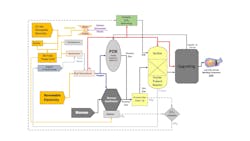DG Fuels advances plan for new SAF complex in Louisiana
DG Fuels LLC, Washington, DC, has secured the land option for a proposed plan to build its grassroots complex for production of sustainable aviation fuel (SAF) on a 3,000-acre site along the west bank of the Mississippi River in St. James Parish, La.
The potential $3.1-billion investment would involve construction of a very low carbon dioxide (CO2) lifecycle emissions complex equipped to produce up to 178 million gal/year of SAF from a feedstock of agricultural and timber waste using DG Fuels’ proprietary high-carbon conversion technology, DGF and the Louisiana Economic Development (LED) said.
Relying entirely on cellulosic waste products like timber trimmings from the logging industry and renewable energy such as wind and solar, DG Fuels’ process differs from other systems by having little or no environmental emissions either to the atmosphere or waters, while at the same time providing the local agricultural community a direct customer for all forms of its agricultural waste, said Michael C. Darcy, the company’s chief executive officer.
With a front-end engineering and design (FEED) study on the St. James Parish site now under way and due for completion by August 2023, DGF said it expects to take final investment decision (FID) on the project by yearend.
If approved, the SAF complex—production from which could remove about 1.65 million tonnes/year (tpy) of CO2 from the atmosphere—would take about 3 years to build, LED said.
DG Fuels—which has already signed a multiyear SAF offtake agreement with Air France KLM for up to 21 million gal/year from the proposed Louisiana plant—previously contracted Black & Veatch to perform feasibility, early engineering, and environmental permitting work on the project, the operator said in late-October 2022.
Should plant construction move forward, Black & Veatch also will serve as engineering, procurement, and construction (EPC) contractor, according to DG Fuels.
LED said DG Fuels’ St. James SAF complex, if completed, would create 1,055 new direct jobs with an estimated average annual salary exceeding $72,000, and result in 5,231 new indirect jobs for a total of 6,286 potential new jobs in Louisiana’s southeast region.
About the Author
Robert Brelsford
Downstream Editor
Robert Brelsford joined Oil & Gas Journal in October 2013 as downstream technology editor after 8 years as a crude oil price and news reporter on spot crude transactions at the US Gulf Coast, West Coast, Canadian, and Latin American markets. He holds a BA (2000) in English from Rice University and an MS (2003) in education and social policy from Northwestern University.

